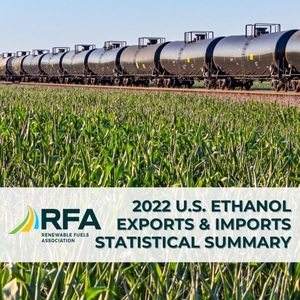RFA reports highlight record value of ethanol, coproduct exports

February 8, 2023
BY Renewable Fuels Association
According to new statistical reports released today by the Renewable Fuels Association, the value of the U.S. ethanol industry’s exports soared to a record level of $7.2 billion in 2022. Ethanol export volumes strengthened to 1.35 billion gallons in 2022, the fourth-highest level on record, amid tight global fuel supplies. Meanwhile, distillers grains shipments registered at 11.0 million metric tons, down slightly from 2021.
For a decade, RFA’s annual trade summaries have provided industry advocates, policymakers, news media, and the public with the latest data and analysis, demonstrating the importance of U.S. ethanol and distillers grains to the world market.
“At a time when global petroleum and agricultural markets were affected by the Russian invasion of Ukraine, the U.S. ethanol industry was proud to enhance energy security at home while at the same time augmenting fuel and feed supplies overseas,” said RFA President and CEO Geoff Cooper. “Exports generated over $7 billion in revenues, providing a vital market for U.S. ethanol producers. Additionally, American-made ethanol helped improve air quality and reduce carbon emissions in more than 80 countries around the world.”
Advertisement
As detailed in the ethanol trade summary report, the 1.35 billion gallons exported in 2022 represented an increase of 9 percent over 2021 and the highest volume since 2019. The value of U.S. ethanol exports surged to $3.77 billion, a record high and an increase of $1 billion over 2021. Shipments to Canada set an annual record for a single destination, tallying more than 500 million gallons. South Korea, the European Union, India, Mexico, and the United Kingdom also were sizable markets.
U.S. imports of fuel ethanol rebounded 36 percent to 79 million gallons, with virtually all imports sourced from Brazil. Still, the United States remained a net exporter for the thirteenth consecutive year, as imports accounted for less than 1 percent of domestic consumption.
Advertisement
The second trade summary report released today covers co-product exports, including distillers grains, a high-protein feed ingredient for livestock and poultry. Distillers grains exports totaled 11.0 million metric tons in 2022, representing nearly a third of domestic production. While export volumes were 5 percent lower than 2021, their value surged to a record $3.4 billion.
The U.S. supplied distillers grains to more than 50 countries. Mexico remained the top export market with a 20 percent share, followed by Vietnam and South Korea.
Hard copies of these analyses will be available to attendees at RFA’s upcoming National Ethanol Conference in Orlando, Florida.
Related Stories
The Michigan Advanced Biofuels Coalition and Green Marine are partnering to accelerating adoption of sustainable biofuels to improve air quality and reduce GHG emissions in Michigan and across the Great Lakes and St. Lawrence Seaway.
EIA reduces production forecasts for biobased diesel, increases forecast for other fuels, including SAF
The U.S. Energy Information Administration reduced its 2025 forecasts for renewable diesel and biodiesel in its latest Short-Term Energy Outlook, released April 10. The outlook for “other biofuel” production, which includes SAF, was raised.
FutureFuel Corp. on March 26 announced the restart of its 59 MMgy biodiesel plant in Batesville, Arkansas. The company’s annual report, released April 4, indicates biodiesel production was down 24% last year when compared to 2023.
Neste has started producing SAF at its renewable products refinery in Rotterdam. The refinery has been modified to enable Neste to produce up to 500,000 tons of SAF per year. Neste’s global SAF production capacity is now 1.5 million tons.
Tidewater expects to make final investment decision on proposed SAF project during second half of 2025
Tidewater Renewables Ltd. has reported that its biorefinery in Prince George, British Columbia, operated at 88% capacity last year. A final investment decision on the company’s proposed SAF project is expected by year end.
Upcoming Events










